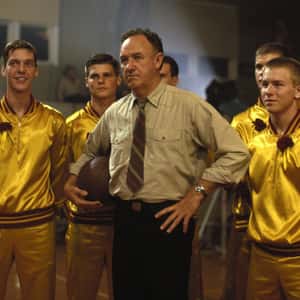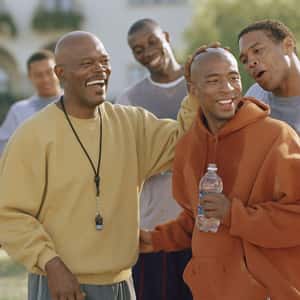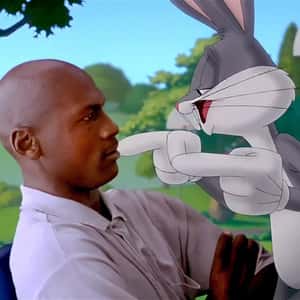In the pantheon of basketball films, the 1986 classic Hoosiers stands tall as a true testament to the underdog spirit that defines the sport. The movie masterfully employs basketball as a medium for exploring themes of redemption and perseverance, while also delving into the social dynamics of a small-town Indiana community. With strong performances by Gene Hackman and Dennis Hopper, Hoosiers showcases an inspiring tale of a once-disgraced coach and a troubled former player who come together to lead an unlikely team to victory. The film's realistic portrayal of high school basketball, memorable characters, and visceral on-court action make it a must-watch for any fan of the genre.
- Released: 1986
- Directed by: David Anspaugh
Based on a true story, Coach Carter (2005) is a powerful drama that uses basketball to tackle themes of discipline, education, and personal responsibility. Samuel L. Jackson stars as Ken Carter, a no-nonsense high school basketball coach who benches his entire team for poor academic performance, teaching them the importance of valuing education over athletics. The film effectively demonstrates how basketball can be used as a tool for instilling character, self-respect, and accountability in young athletes. With its inspirational message and heartfelt performances, Coach Carter not only entertains but also leaves a lasting impact on viewers.
- Released: 2005
- Directed by: Thomas Carter
White Men Can't Jump is a 1992 sports comedy that uses basketball as a backdrop to explore themes of race, friendship, and personal growth. Wesley Snipes and Woody Harrelson play two streetball hustlers from different backgrounds who, despite their constant bickering, form an unlikely bond over their shared love of the game. The film's insightful commentary on racial stereotypes and the witty banter between its protagonists highlight the cultural significance of basketball in urban America. While keeping audiences entertained with its humor and exciting on-court action, White Men Can't Jump also serves as a compelling examination of the unique relationships forged by the sport.
- Released: 1992
- Directed by: Ron Shelton
Spike Lee's 1998 film He Got Game uses the world of basketball as a lens to examine father-son relationships, the pressures of fame, and the shadows of past mistakes that can haunt one's future. Denzel Washington stars as a convict who is granted temporary release to convince his estranged son, a top high school basketball prospect played by NBA star Ray Allen, to play for the governor's alma mater. The film's compelling narrative and gritty urban backdrop effectively highlight the transformative power of the sport and the difficult choices that come with it. He Got Game is an unflinching portrayal of the dark side of basketball stardom, making it an essential entry in the genre.
- Released: 1998
- Directed by: Spike Lee
The 1996 film Space Jam is a unique fusion of live-action and animation that uses the world of basketball to blend in fantastical elements, creating an unforgettable viewing experience. Starring NBA legend Michael Jordan alongside the iconic Looney Tunes characters, the film explores themes of teamwork, determination, and self-belief through its entertaining narrative. Space Jam not only showcases impressive on-court action but also highlights how the sport transcends reality, bringing together diverse worlds and characters. A nostalgic classic for audiences of all ages, this innovative film remains a beloved entry in the realm of basketball cinema.
- Released: 1996
- Directed by: Joe Pytka
Inspired by a true story, Glory Road (2006) uses basketball as a means to confront the racial barriers and prejudices that were prevalent in the 1960s. The film chronicles the journey of Texas Western coach Don Haskins, who led the first all-black starting lineup to an NCAA championship victory. Basketball serves as a powerful symbol of unity and equality, as the team's success helps break down long-standing racial divides. With its stirring performances and engaging story, Glory Road stands as a poignant reminder of the game's power to bring about social change.
- Released: 2006
- Directed by: James Gartner
Ranked by







